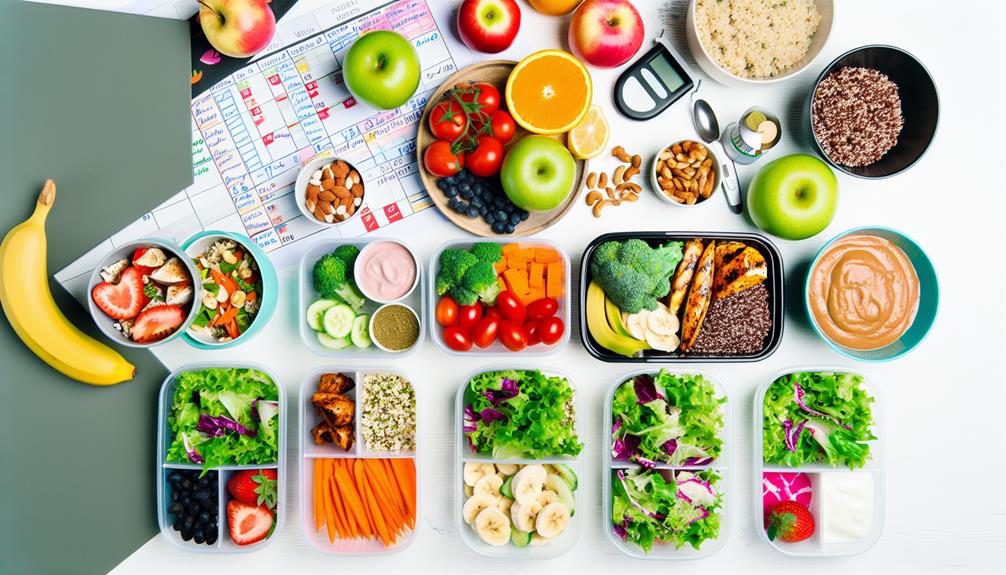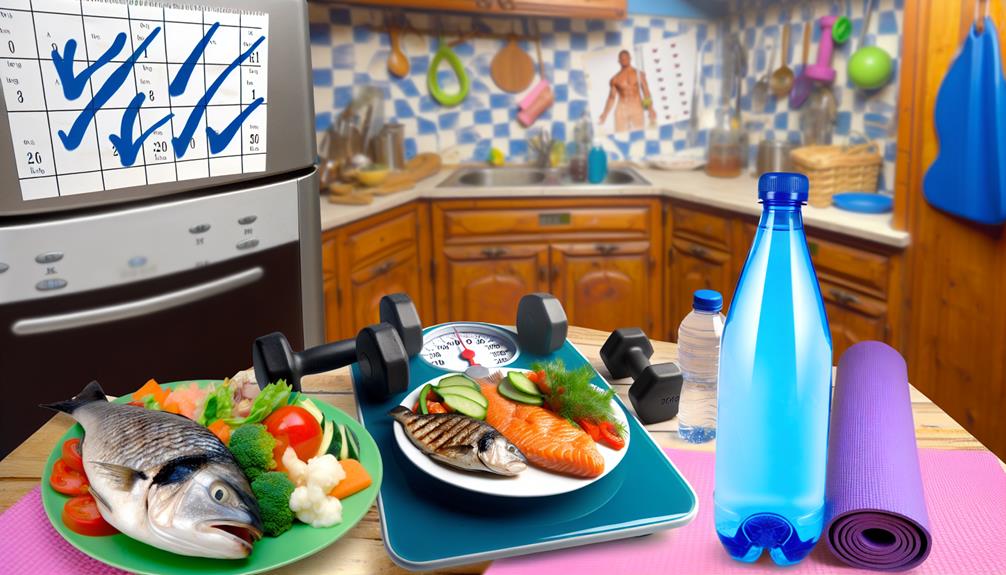To lose 1 kg in a week, you'll need to create a caloric deficit of about 7,700 calories. This means combining sensible eating with increased physical activity. Focus on nutrient-dense foods like lean proteins, whole grains, and high-fiber vegetables to help control hunger. Aim for structured exercise—at least 150 minutes of moderate activity and strength training twice a week. Keep portion sizes in check, and drink plenty of water. Consistency is key, so track your meals and progress. By staying committed, you can achieve your goal, and there's plenty more to explore on how to maintain your success.
Key Takeaways
- Create a caloric deficit of 7,700 calories weekly through diet and exercise to lose 1 kg.
- Incorporate nutrient-dense foods and maintain a balanced macronutrient ratio for satiety.
- Engage in at least 150 minutes of aerobic activity and strength training weekly to enhance calorie burn.
- Monitor your food intake with a diary to identify and reduce excess calories hindering weight loss.
- Stay hydrated by drinking at least eight glasses of water daily to support metabolism and control hunger.
Understanding Weight Loss Principles

When it comes to understanding weight loss principles, you need to grasp the concept of caloric deficit. To lose 1 kg in a week, you must create a caloric deficit of about 7,700 calories. This means you'll need to combine dietary changes with increased exercise to reach your goal sustainably.
Aiming for a safe weight loss rate of 0.5 to 1 kg per week helps reduce the risk of losing muscle or facing nutritional deficiencies.
Consistency is key in maintaining that caloric deficit. You'll want to monitor your caloric intake and expenditure regularly. By increasing your physical activity—whether through structured exercise or daily movement—you'll considerably boost your energy expenditure, making it easier to achieve your weight loss goals.
Incorporating healthy habits into your routine not only helps you lose body fat but also fosters long-term adherence to a healthier lifestyle.
Key Components of a Diet Plan

A successful diet plan emphasizes nutrient-dense foods that provide essential vitamins and minerals while helping you create a caloric deficit.
Focus on incorporating healthy options like fruits, vegetables, whole grains, lean proteins, and healthy fats. Balancing your macronutrients—roughly 30% protein, 40% carbohydrates, and 30% healthy fats—can enhance satiety and support your weight loss efforts effectively.
High-fiber foods, such as legumes and whole grains, are vital for reducing hunger and promoting fullness, which aids in calorie control.
Meal timing also plays a significant role; aim for smaller meals every 3-4 hours to maintain your metabolism and prevent overeating.
You'll find that regular eating can keep your energy levels up without feeling deprived.
Sample 7-Day Meal Plans

Creating a 7-day meal plan is an effective way to stay on track with your weight loss goals. By focusing on nutrient-dense foods, you can efficiently lose 1kg a week while enjoying a variety of flavors.
Start your day with breakfast like Greek yogurt topped with berries, which offers lean proteins and antioxidants. For lunch, try a grilled chicken salad packed with colorful vegetables and whole grains to keep you satisfied.
Incorporate high-fiber foods into your snacks, like almonds or carrot sticks with hummus, to help control hunger between daily meals. Dinner could feature a quinoa bowl with roasted vegetables and a source of lean protein, ensuring you maintain a caloric deficit without sacrificing taste.
Don't forget the importance of hydration! Aim for at least eight glasses of water daily, as staying hydrated supports your metabolism and enhances your weight loss efforts.
This 7-day meal plan won't only help you achieve your weight loss goals but also empower you to make healthier choices that fit your lifestyle. Embrace the freedom that comes with balanced eating and enjoy the journey to a healthier you!
Tips for Successful Weight Loss

Staying committed to your weight loss journey involves more than just meal planning; it's about adopting habits that support your goals.
To lose 1 kg a week, focus on creating a caloric deficit of around 7,700 calories through a combination of smart eating and regular physical activity. Embrace high-fiber foods like whole grains and vegetables, which help you feel fuller and reduce overall calorie intake.
Incorporate at least 150 minutes of moderate aerobic exercise each week, along with strength training twice a week to enhance fat loss while maintaining muscle. This regular physical activity is crucial for your success.
Practice portion control by reducing your serving sizes slightly—just a 10-20% decrease can lead to significant calorie savings over time.
Don't forget to stay hydrated. Drinking at least eight glasses of water daily aids in appetite control and supports your overall metabolic health.
Focus on these healthy habits, and prioritize protein in your meals to keep your energy up and support muscle repair.
With dedication and these practical tips, you'll be on your way to losing body fat and achieving the freedom you desire.
Monitoring Your Progress

Monitoring your progress is essential to achieving your weight loss goals. By keeping a food diary, you can document everything you eat and drink, which helps you identify any extra caloric intake that might be hindering your progress.
Regular weigh-ins, ideally done at the same time each week, enable you to track changes and assess how effective your weight loss strategies are. If you notice a plateau, it might be time to reassess your caloric intake and adjust your diet plan accordingly.
Technology can be a game changer here; utilizing apps for tracking both food and exercise gives you valuable insights into your habits over time.
Don't underestimate the power of personalized advice. Consulting with a nutritionist can enhance your monitoring efforts and provide you with tailored strategies to guarantee your weight loss journey is effective and sustainable.
Overcoming Common Challenges

Weight loss journeys often come with hurdles that can derail your progress if not addressed properly. One of the biggest challenges is managing cravings and hunger. To overcome this, drink water before meals and focus on high-fiber foods that promote satiety, helping you reduce your overall calorie intake.
When dining out, choose grilled or baked options and always request dressings on the side to practice portion control.
Staying motivated is vital; a food diary can be your ally in tracking progress. Documenting your meals and setting small, achievable goals will help maintain your focus and commitment. Remember, motivation can wane, but healthy habits can carry you through.
Planning for social situations is essential. Prep meals in advance and practice portion control to mitigate the temptation to overeat.
Conclusion
To sum up, losing 1kg a week is achievable with the right approach. By understanding weight loss principles, creating a balanced diet plan, and staying committed to your goals, you can make steady progress. Remember to monitor your progress and adjust as needed, while staying motivated to overcome challenges. With determination and consistency, you'll not only reach your weight loss target but also develop healthier habits for the long run. Embrace the journey, and you'll succeed!

